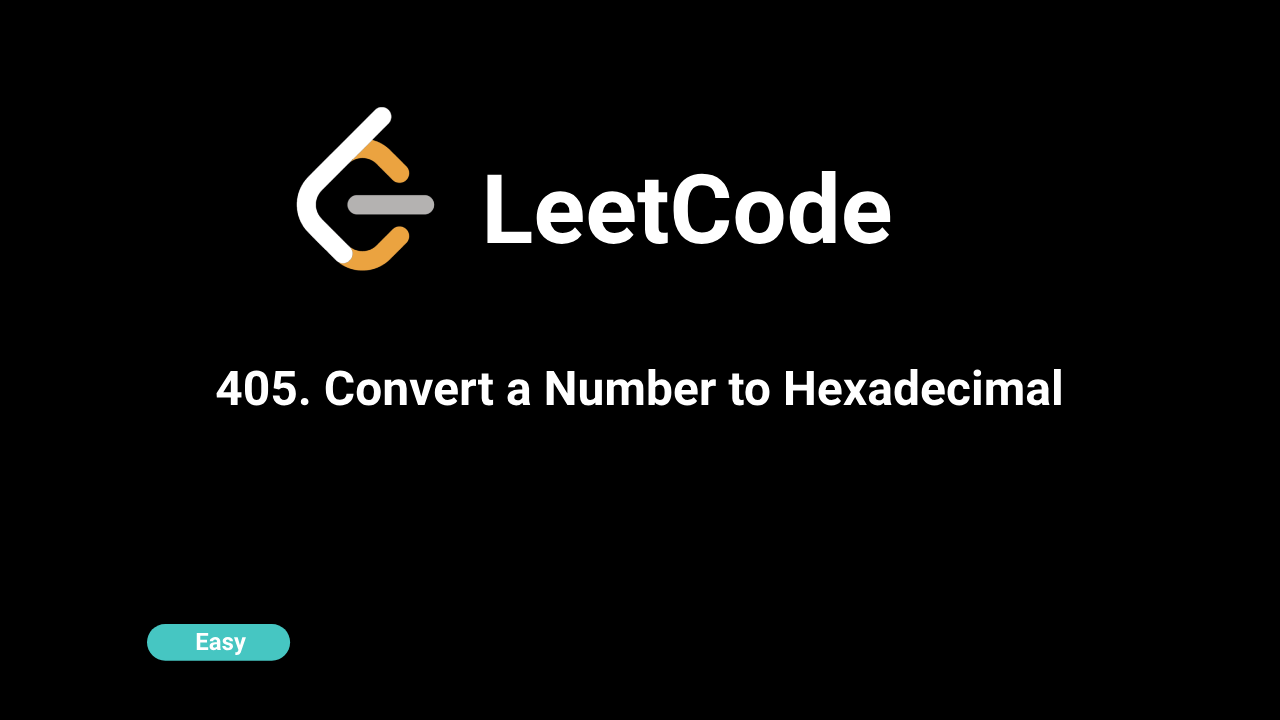
Description
The problem is to convert a given integer into its hexadecimal representation. The integer can be positive or negative. For negative numbers, the function should treat them as unsigned integers in the range of 32-bit numbers. The function must return a string representing the hexadecimal value, without the "0x" prefix, and it should work for both negative and positive numbers.
Intuition
Hexadecimal numbers use base 16, represented by the digits 0-9 and the letters a-f. For non-negative numbers, repeatedly dividing the number by 16 and storing the remainders gives the hexadecimal representation. For negative numbers, we can use the unsigned 32-bit representation, effectively adding 2^32 to handle negative numbers.
Approach
- Define a string or list containing the hexadecimal digits
0-9anda-f. - If the number is 0, return "0" directly.
- If the number is negative, convert it to its 32-bit unsigned equivalent by adding
2^32to the number. - Continuously divide the number by 16 and store the remainder at each step, which corresponds to the hexadecimal digit.
- Stop when the number becomes 0.
- Finally, combine the digits and return the hexadecimal string.
Complexity
Time Complexity:
O(log n) where n is the input number. This is because we are repeatedly dividing the number by 16.
Space Complexity:
O(log n), as we store the digits of the hexadecimal number in a string or list.
Code
C++
class Solution {
public:
string toHex(int num) {
string hexas = "0123456789abcdef";
if (num == 0) return "0";
if (num > 0 && num <= 15) return string(1, hexas[num]);
unsigned int n = num;
string result = "";
while (n > 0) {
result = hexas[n % 16] + result;
n /= 16;
}
return result;
}
};Python
class Solution:
def toHex(self, num: int) -> str:
hexas = "0123456789abcdef"
if num == 0:
return "0"
if num > 0 and num <= 15:
return hexas[num]
if num < 0:
num += 2**32
result = []
while num > 0:
result.append(hexas[num % 16])
num //= 16
return ''.join(result[::-1])Java
class Solution {
public String toHex(int num) {
char[] hexas = {'0', '1', '2', '3', '4', '5', '6', '7', '8', '9', 'a', 'b', 'c', 'd', 'e', 'f'};
if (num == 0) return "0";
if (num > 0 && num <= 15) return Character.toString(hexas[num]);
long n = num; // handle negative values
if (n < 0) n += (1L << 32);
StringBuilder result = new StringBuilder();
while (n > 0) {
result.insert(0, hexas[(int)(n % 16)]);
n /= 16;
}
return result.toString();
}
}JavaScript
var toHex = function (num) {
const hexas = {
0: 0, 6: 6, 10: "a",
1: 1, 7: 7, 11: "b",
2: 2, 8: 8, 12: "c",
3: 3, 9: 9, 13: "d",
4: 4, 14: "e",
5: 5, 15: "f"
}
if (num >= 0 && num <= 15) return hexas[num].toString();
if (num < 0) num = num >>> 0;
let newArr = [];
while (num >= 16) {
let rest = (num % 16);
newArr.unshift(hexas[rest]);
num = Math.floor(num / 16);
}
newArr.unshift(hexas[num]);
return newArr.join("");
};